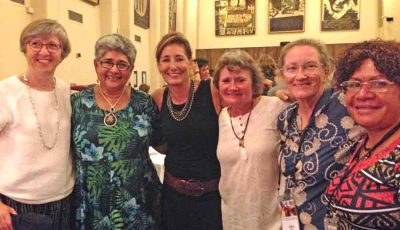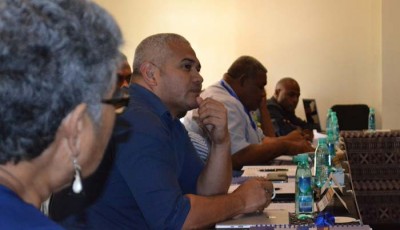30 Pacific police officers graduate from FWCC course

The 30 graduating police officers from 11 Pacific countries with Australian Federal Police’s detective superintendent Todd Hunter, front, fourth from right, Fiji Women’s Crisis Center coordinator Shamima Ali, fifth from right, AFP’s Lautoa Faletau, second from right, and deputy division commander west, Superintendent Abdul Khan, fifth from left, along with FWCC staff. (Contributed Photo)
NADI, Fiji—A cohort of 30 officers from 11 Pacific countries will return to their posts looking at violence against women through new lenses after successfully completing an intensive two-week course in Nadi.
The officers graduated Friday from the Fiji Women’s Crisis Center’s Police Regional Training Program at the Hexagon Hotel in Nadi. Funded by the Australian Federal Police, the training aims to equip officers with a thorough understanding of gender dynamics, the causes of violence against women and the relevant laws designed to combat gender-based violence.
Represented during the training were Cook Islands, Fiji, Kiribati, Nauru, Niue, Papua New Guinea, Samoa, Solomon Islands, Tonga, Tuvalu, and Vanuatu.
Fiji Women’s Crisis Center coordinator Shamima Ali, who facilitated the course, said sensitizing police officers to gender and violence against women was crucial as they were the first responders to women who report any form of violence.
“Many women have bad experiences at police stations, often being subjected to further degradation and victim-blaming. This has the effect of discouraging women from coming forward to seek justice and lets the perpetrator walk free to commit further violence,” said Ali.
“Training courses like this help police officers gain an insight into why violence happens and what survivors of violence experience so they are better sensitized when dealing with cases back in their stations.”
Detective superintendent Todd Hunter, the coordinator of the AFP’s Pacific Police Development Program – Regional, attended the closure of the program. At the ceremony he commented that the importance of this training cannot be understated.
“The training provided during the Fiji Women’s Crisis Center program is a high priority and a critical component of the Australian Federal Police’s focus on gender, human rights and violence against women and children throughout the Pacific.
“Sponsoring programs such as this, in partnership with the FWCC, is aimed at ensuring police and community awareness of these issues is heightened and positive behavioral change occurs.
“Police as first responders must have the capability to deal both sensitively and within the law with gender-based issues. As police officers it is our sworn duty to work within and uphold the rule of law to protect the communities we serve—that is the fundamental of policing and is the same regardless of which country or what police force you are from,” said Hunter.
He acknowledged the excellent work being done in this area by Shamima Ali and the FWCC team.
“I encourage all participants to take what they have learned and implement it into their policing duties, including challenging what may be ingrained thinking in respective communities,” he said.
“The AFP looks forward to continuing to support gender and human rights training and awareness in Pacific to improve policing response to sexual and gender based violence.”
The participants already recognize the change in their attitudes and what they need to do when they return to their posts.
“Coming to this workshop has really increased my knowledge and I see there is a big need for police officers to improve our response and really understand things from the victim’s perspective. Our professional approach to victims must improve,” said Sgt. Ruth Murup from Papua New Guinea.
Sgt. Mary Ake of the Royal Solomon Islands Police Force said: “All police officers must go through this training; it should be in our police academy, especially for frontline police officers.”
Senior constable Tauketalata Vakalahi of Tonga said: “This training has filled in gaps because we didn’t realize that the little things we did that hurt the victim, like not taking their case seriously.”
Attending the graduation Friday was the deputy divisional commander of the West Division, superintendent Abdul Khan, who also presented some of the certificates.
The AFP-FWCC Regional Police Training Program was first held in 2014, with this being the fourth. In May 2016, a Regional Police Training was held in the Federated States of Micronesia, the first of its kind for officers in the Northern Pacific countries.
The graduation of the current cohort on Nov. 18 brings the number of graduates to 110 regional police officers. (PR)


























